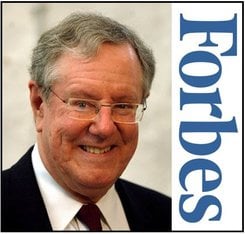Why were a majority of shares of Forbes Media sold to Integrated Whale Media Investments, a group of international investors based in Hong Kong? The company had announced last November that it was looking for a buyer and was working with Deutsche Bank AG to find one.
Like other well known established print media companies in this digital age, Forbes has been struggling with a shifting audience and advertisers to online sources.
Advertising revenue last year was 5% down, while ad pages declined by 10%; the company had been posting worse figures than the magazine industry average.
According to the Forbes family, it will continue to have “a significant stake” in the business and Steve Forbes will remain as Chairman and Editor-in-Chief. Mike Perlis, the current CEO, will carry on as head of the company’s management team.
Mr. Perlis, who said that Forbes had already been working with Integrated Whale Media Investments’ management through their existing real estate and financial services lines of business, added:
“This significant investment in the company is a strong endorsement of the global strength of our brand, as well as our progress and innovative plans for continued growth.”
When the deal is done, probably this year, Elevation Partners, an investment group that bought a 45% stake for $240 million in 2006, will fully exit its investment in Forbes Media.
Print-to-digital environment
Things had gotten so bad for the company that in 2006 it had to sell its Manhattan headquarters building to raise money. After that it focused on entering the digital publishing industry.
In November 2013, Forbes said it was seeking about $400 million. Unfortunately, during the months that followed potential suitors came forward with only half that amount.
Steward Pinkerton, author of the book “The fall of the House of Forbes”, made an accurate prediction. Last year he said “The thought has always been that some rich guy in the Middle East, or some guy in Hong Kong, or a Russian oligarch would buy it.”
Steve Forbes wrote yesterday:
“Today, we announced that we have reached an agreement to sell a majority interest in Forbes Media to a group of international investors. This is obviously a momentous occasion for the Forbes family and the team here at Forbes. But, it represents an opportunity for extraordinary advances for us that would have been inconceivable just a few short years ago.”
If an entity has a majority interest in a company, it means that it owns more than 50% of its shares.
The Internet changed everything
Mr. Forbes explained that the communications industry’s operating model that had started in the 1830s with the invention of the steam press, was blasted away by the web.
When the Internet was born so was mass media, which is mainly supported by advertising. Historically, most print publications (with the exception of Forbes) were sold at a loss. Editors and reporters created content and profit margins were gained from advertising.

The Internet made this business model obsolete. Everybody can be a content-creator today. Facebook and Google, among millions of other websites, can now command tens of billions of dollars in advertising. Print revenues are declining rapidly.
Regarding content, Mr. Forbes said:
“With few exceptions – and who knows how long these will last – content is free, like bread and water at restaurants. Advertisers are using metrics to try to measure effectiveness in ways not possible before the digital era. This state of flux has been harrowing for legacy companies. The “creative destruction” wrought by the Internet, moreover, is just beginning.”
Creative destruction refers to capitalism’s ability to innovate, destroy and reinvent itself.
About Integrated Whale Media Investments
Newly-formed Integrated Whale Media Investments (IWM) is based in Hong Kong and consists of a group of international investors. It is led by Integrated Asset Management (Asia) Ltd. (IAM).
Hong Kong-based IAM was founded by Tak Cheung Yam. It is an investment firm specializing in public and private equity investments, with expertise in technology, finance and telecommunications.
“Given the tremendous growth of digital in the past decade, Forbes Media’s future plans include additional Internet and social media expansion projects.”
Wayne Hsieh, co-founder of Singapore-based ASUSTek Computer Inc., is another significant IWM investor. His company is one of the world’s largest PC vendors and the biggest motherboard manufacturer globally.
Wayne Hsieh said:
“We see enormous potential to extend the Forbes brand, building on its innovation and the solid foundation of a media company known for excellence in business journalism with an extensive print and digital footprint and a diverse array of branded products.”
IWM will provide capital, as well as financial and operational expertise. According to Forbes, it plans to leverage its global relationships to strategically widen Forbes Media’s reach internationally.
Established newspapers gradually being sold off
In August, 2013, three famous names were sold off.
- In August, 2013, the prestigious Washington Post, the most widely circulated newspaper in the Washington D.C. area that dates back to 1877, was sold to Amazon.com founder and CEO Jeffrey P. Bezos. The Graham family agreed to a $250 million cash deal for the purchase of the Washington Post and several other publications belonging to the group.
- In August, 2013, Newsweek, once the second-largest news weekly journal, was sold to IBT Media, a 100% digital company. Newsweek started off in New York City in 1933. It was launched by the former foreign-news editor of Time, Thomas J.C. Martyn.
- In August 2013, the 141-year-old Boston Globe was sold by the New York Times to John W. Henry, owner of the Boston Red Sox baseball team and England’s Liverpool Football (soccer) Club, for just $70 million. Twenty years ago the New York Times had paid $1.1 billion for the newspaper.

